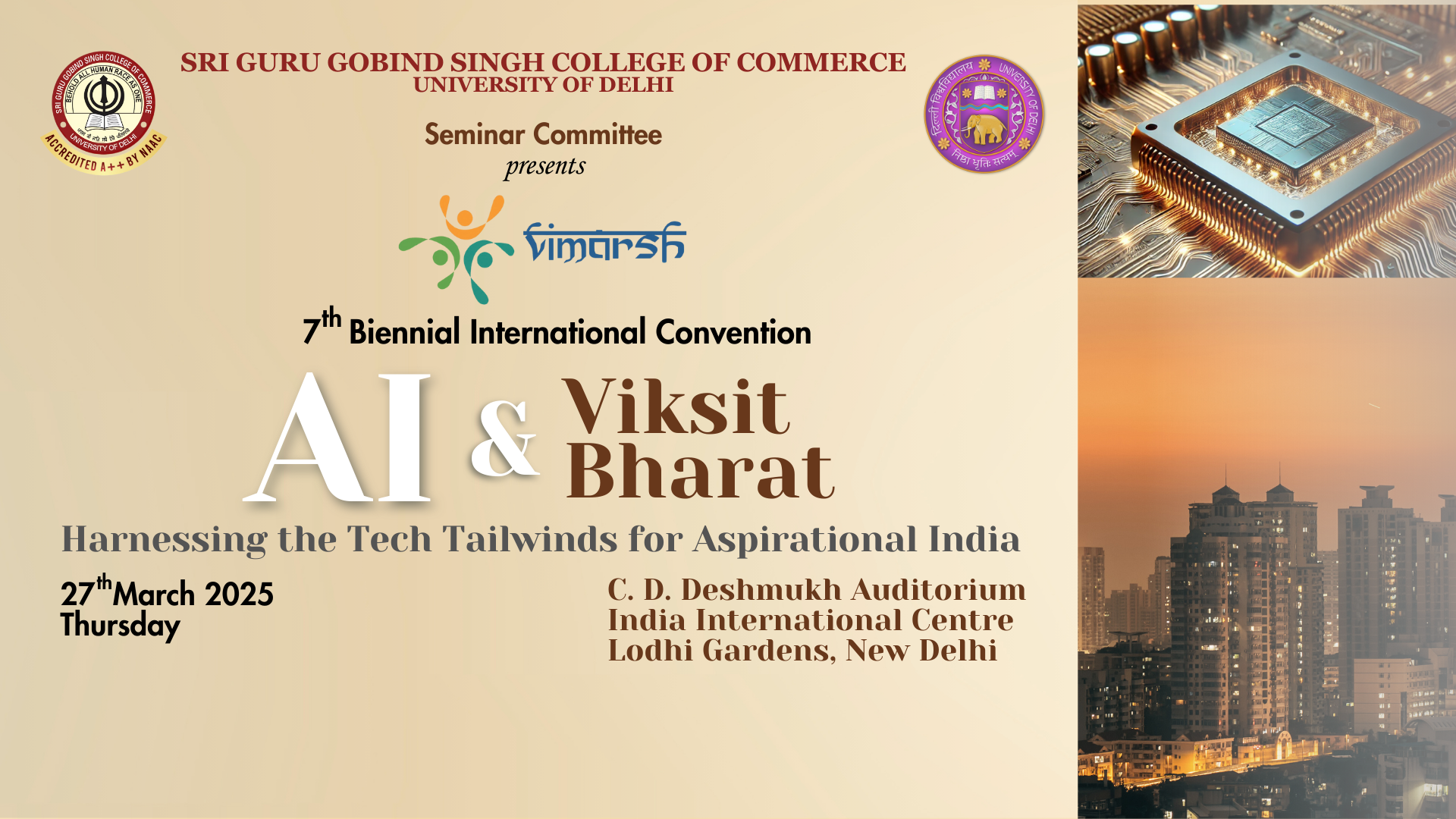
Sri Guru Gobind Singh College of Commerce, founded in 1984 is a leading institute of the University of Delhi specialising in Commerce, Economics, Business Studies, and Computer Science. It was accredited with an ‘A++’ grade by National Assessment and Accreditation Council (NAAC) in 2022. The College has diligently worked its way to develop future leaders in business, government, and academia by offering excellence in education and imparting training. It regularly conducts Seminars, Conferences, Workshops and Faculty Development Programmes to ensure holistic pursuit of education in terms of inquisitive research orientation, analytical rigor, and quantitative skill enhancement of students as well as the teaching fraternity. Further, to promote empirical research, it publishes an annual peer-reviewed research journal, “Journal of Business Thought”, ranked in ABDC (applied economics category).
To keep abreast of recent developments and encourage research, the College organises Biennial Conferences and Conventions on contemporary economic and social issues. These events have always been graced by the presence of several noted luminaries, economists, academicians, researchers, journalists, and political leaders in the past. In March 2023, the College successfully conducted its 6th Biennial International Convention on the topic, “India on the Path to Sustainable and Inclusive Development: Myth or Reality”.
7th Biennial Convention on “AI for Viksit Bharat: Harnessing the Tech Tailwinds for Aspiration India”
Artificial Intelligence or AI is the ability of a machine to learn from experience, adjust to new inputs and perform human-like tasks. Current period of remarkable technological advancement in many domains has led to the optimism that the AI Spring has not only come but is solidly rooted. AI is transforming economies and societies around the world by revolutionizing industries, enhancing governance, and fostering inclusivity.
AI with its incredible accuracy, deeper data analysis, progressive learning, easy availability and quicker decision-making is likely to play a pivotal role in India’s transformation to a “Developed Nation” aka Viksit Bharat. AI’s contribution in enhancing the quality of life and developing a stronger economy with an advanced technological infrastructure is exceptional. With the aid of AI, India has been able to enhance productivity and create new opportunities in various sectors, including manufacturing, services and agriculture. Be it the use of machine learning algorithms to improve health-care diagnostics and treatment plans or precision farming to monitor and manage crops while optimizing planting, irrigation, and harvesting, AI has made its mark. When it comes to finance revolution, AI has come up with a multitude of applications such as algorithmic trading, customer-service chatbots, risk assessment, fraud detection and credit scoring amongst others. The energy sector has embraced predictive AI to foresee equipment failures, thereby optimizing resource allocation while reducing downtime and energy consumption. Amongst other development goals, a crucial objective is setting up of “smart cities”. To this end, AI can contribute to creation of smart infrastructure, optimal resource management, and improvement in quality of life with innovations in transportation, energy management, and public services. AI aids in creating sustainable urban environments by analysing data on population growth, resource consumption, and environmental impact.
Inaugural Session: "How AI is Shaping India’s Economic Landscape"
As "Viksit Bharat" envisions a digitally empowered nation, AI will play a critical role in this transformation by improving efficiency, automating processes, and enabling advanced data analytics. This can lead to better services in healthcare, education, and governance. As part of the vision for a developed India, there is a focus on upgrading skills and education. AI-driven technologies can facilitate this by offering new learning tools, personalized education experiences, and skill development platforms. AI can enhance governance by improving transparency, efficiency, and accessibility of public services. This includes automating bureaucratic processes, improving law enforcement, and providing better citizen engagement platforms.
Though, AI has the potential to drive significant economic growth through increased productivity, innovation, and efficiency, a crucial conundrum is that low-skilled workers fear losing their jobs to AI and automation. As per the Economic Survey 2023-24, accelerated growth in AI is the biggest disruption in the future of work. In fact, AI poses both risk and opportunity to the Indian economy. GenAI is likely to lead to decline in employment opportunities in the BPO sector considerably in the next ten years. In the following decade, however, gradual diffusion of AI is expected to augment productivity, given the affinity of India’s population to work with technology, supplemented with proactive interventions by the Government and industry. Also, the benefits from penetration of AI may not be evenly distributed. Wealthier individuals may reap more rewards, potentially aggravating economic inequalities. Ensuring inclusive access to AI benefits and addressing disparities is a key challenge.
The Inaugural Session will provide insights into AI-driven economic transformation in India. Experts from academia, industry, and government will discuss- AI’s impact on productivity, job creation, and entrepreneurship; AI-enabled policy frameworks and governance models; and Challenges in AI adoption and necessary regulatory measures.
Plenary Session: “Harnessing the Tech Tailwinds for Aspirational India”
AI holds immense potential to drive economic growth, improve quality of life, and foster innovation across various sectors- paving the move towards Viksit Bharat and Sustainable Development. With a steadfast commitment to technological development and advancement, the government has embarked on a journey that has led to the economic, technological, and entrepreneurial transformation of the nation. With a vision of Making AI in India and Making AI Work for India, the Cabinet has approved the comprehensive national-level India AI mission.
As India strides towards becoming a global economic powerhouse, technology emerges as a critical enabler of growth, inclusion, and resilience. The plenary session on “Harnessing the Tech Tailwinds for Aspirational India” will bring together thought leaders, policymakers, industry experts, and academicians to discuss how cutting-edge technological advancements can shape India's future. From digital governance to industrial transformation and agritech solutions, the session will explore how India can effectively leverage technology to drive economic growth, social progress, and sustainable development.
Plenary Session-Key Sub-Themes for Discussion: AI & Automation in the Indian Economy; Agritech & Rural Transformation, Industry 4.0 & Manufacturing, Healthcare & Biotechnology, Digital Infrastructure & Connectivity, FinTech & Digital Payments, Tech-Driven Governance, Ethical & Regulatory Challenges, Logistics & Supply-chain.
Networking Session: Fostering Collaborations for AI-Driven Viksit Bharat
The concluding session will provide a platform for networking and collaboration among stakeholders. The discussion will focus on building academia-industry-government collaborations and advance the synergy between research institutions, businesses, and policymakers to accelerate AI adoption and innovation. Identifying key research gaps and encouraging cross-sector initiatives that align with India’s economic and social development goals is pertinent. Important in this respect is enhancing AI education and workforce preparedness by fostering university-industry collaboration in curriculum design, internships, and research opportunities. The session will promote associations on industry-sponsored AI research, AI-driven policy interventions, and collaborative funding models.
The convention aims to provide pragmatic policy recommendations for AI integration in national development strategies, supplement identification of key sectors and AI-driven initiatives for rapid progress and to strengthening academia-industry-government collaboration to accelerate AI adoption.
Executives, consultants, administrators, advisors and strategists involved in policy making impacting adoption of AI.
Researchers and academicians who are studying challenges and opportunities presented by extension and adoption of AI.
Professionals impacted by adoption of AI
| Name | Designation |
| Organising Commitee | |
| Patrons | |
| Prof. (Dr.) Jatinder Bir Singh | Principal, Sri Guru Gobind Singh College of Commerce, University of Delhi |
| Dr. Vaibhav Puri | Convenor, Assistant Professor Department of Economics |
| Dr. Harpreet Kaur | Co-Convenor, Associate Professor Department of Economics |
| Members | |
| Prof. Jyoti Kaur | Professor Department of Hindi |
| Prof. D.D Chaturvedi | Professor Department of Economics |
| Prof. Paramjeet Kaur | Associate Professor Department of Economics |
| Ms. Jasjit Kaur Kochhar | Associate Professor Department of English |
| Dr. Gurminder Kaur Arora | Associate Professor Department of Commerce |
| Dr. Rekha Sharma | Associate Professor Department of Economics |
| Ms. Ushveen Kaur | Assistant Professor Department of Computer Science |
| Ms. Shelly Verma | Assistant Professor Department of Business Economics & Management |
| Dr. Megha Ummat | Assistant Professor Department of Computer Science |
| Dr. Tarvinder Kaur | Assistant Professor Department of Punjabi |
| Mr. Bhupinder Pal Singh | Assistant Professor Department of Punjabi |
| Ms. Ankita Aggarwal | Assistant Professor Department of Business Economics & Management |
| Dr. Kriti Chadha | Assistant Professor Department of Business Economics & Management |
| Ms. Manleen Kaur | Assistant Professor Department of Commerce |
| Dr. Meenakshi Rani | Assistant Professor Department of Hindi |
| Dr. Jasneet Kaur | Assistant Professor Department of Commerce |
| Ms. Pratibha Suri | Assistant Professor Department of English |
| Ms. Hersheen Kaur | Assistant Professor Department of Commerce |

GIS Pharma,is a leading pharmaceutical company headquartered in Bangkok,Thailand. Established in 2002,GIS Pharma has emerged as a trusted provider of high-quality pharmaceutical products and regulatory services to both domestic and international markets.

ESSKAY CONCAST AND MINERALS PRIVATE LIMITED is a Private Limited Company, governed by the Companies Act as a company limited by shares. Classified as a Non-government company. Esskay Concast AND Minerals Private Limited is majorly in Business Services business from last 14 years

State Bank of India (SBI) a Fortune 500 company, is an Indian Multinational, Public Sector Banking and Financial services statutory.SBI is the largest banking and financial services organization in India, with an asset base of over Rs. 61 trillion.

Punjab and Sind Bank was established in the year 1908.The principle mission of its foundation involves economic aid to the weaker section of the society.Punjab and Sind Bank is a pacemaker in the banking space. It is also a full-service digital bank, empowering millions of people across the length and breadth of the country to access its products and services
































